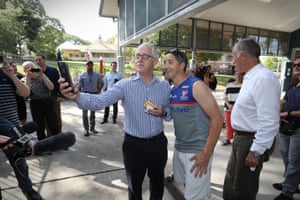Extract from The Guardian
Putting the vote on the date of the Labor conference may be trolling-by-scheduling, but Shorten could well be relieved
It
should be clear to anyone watching politics right now that no one is
bringing a knife to a gun fight, but it became abundantly clear when the
Speaker, Tony Smith, updated the House of Representatives just after
question time on Thursday.
All week, the denizens of the parliament had been sweating on the date for the byelections triggered by the last vestige of the dual-citizenship crisis. The days of the sitting week passed. Tick tock. Still, no date.
On Thursday we had a date, and hey presto, it was the same weekend as Labor’s national conference. What a coincidence. Of all the gin joints in all the towns in all the world, she walks into mine.
Given the obvious political provocation, a bit of trolling-by-scheduling, a boilover on the opposition benches was predictable, and the boilover happened.
Tony Burke tried to be gracious, given he rates Smith’s professionalism, but testiness bubbled to the surface. July 28 just happened to be the weekend of the national conference, the manager of opposition business noted, lips pursed.
Labor’s Senate leader, Penny Wong, felt little obligation to feign graciousness and just bored straight into the electoral commissioner, Tom Rogers. This was all a bit convenient, Wong thought, the electoral commission telling the government July 28 was “optimal” for the byelections.
Wong pointed out that byelections and elections had been scheduled previously during school holidays (one of Rogers’ reasons for suggesting delaying the contests almost two months) and democracy had not crumbled.
Rogers was having none of it. He said he provided advice to the Speaker of the House, and it was the Speaker of the House who made the decision.
He also thought he might take a moment to give Wong, and possibly the political class watching on all around the parliament, a short homily about precisely who had created the botch up in the first place.
The electoral commissioner noted that we were having byelections because several MPs had resigned “as a result of failing to follow procedures”. He thought it was a bit rich for the AEC to be “fingered” as somehow responsible for the debacle, and didn’t fancy being anyone’s passing cat to kick.
Rogers is right of course. That is why we are in this mess; that and our complete joke of an accountability and enforcement regime which permits politicians to think complying with constitutional requirements is entirely optional. But Wong wasn’t in the mood for a homily. She was in the mood for a mauling.
So what are the practical consequences of super Saturday on 28 July?
It looks almost certain that Labor will postpone the national conference given the impossibility of having key operatives in the party’s campaign machine locked away jawboning and arm-twisting in an Adelaide conference room when they need to be out in marginal seats getting candidates elected.
Labor will blow cash on a cancellation. Lots of things – flights, venue, accommodation – are pre-booked. No political party in Australia can afford to blow cash. Obviously no one will be celebrating.
All week, the denizens of the parliament had been sweating on the date for the byelections triggered by the last vestige of the dual-citizenship crisis. The days of the sitting week passed. Tick tock. Still, no date.
On Thursday we had a date, and hey presto, it was the same weekend as Labor’s national conference. What a coincidence. Of all the gin joints in all the towns in all the world, she walks into mine.
Given the obvious political provocation, a bit of trolling-by-scheduling, a boilover on the opposition benches was predictable, and the boilover happened.
Tony Burke tried to be gracious, given he rates Smith’s professionalism, but testiness bubbled to the surface. July 28 just happened to be the weekend of the national conference, the manager of opposition business noted, lips pursed.
Labor’s Senate leader, Penny Wong, felt little obligation to feign graciousness and just bored straight into the electoral commissioner, Tom Rogers. This was all a bit convenient, Wong thought, the electoral commission telling the government July 28 was “optimal” for the byelections.
Wong pointed out that byelections and elections had been scheduled previously during school holidays (one of Rogers’ reasons for suggesting delaying the contests almost two months) and democracy had not crumbled.
Rogers was having none of it. He said he provided advice to the Speaker of the House, and it was the Speaker of the House who made the decision.
He also thought he might take a moment to give Wong, and possibly the political class watching on all around the parliament, a short homily about precisely who had created the botch up in the first place.
The electoral commissioner noted that we were having byelections because several MPs had resigned “as a result of failing to follow procedures”. He thought it was a bit rich for the AEC to be “fingered” as somehow responsible for the debacle, and didn’t fancy being anyone’s passing cat to kick.
Rogers is right of course. That is why we are in this mess; that and our complete joke of an accountability and enforcement regime which permits politicians to think complying with constitutional requirements is entirely optional. But Wong wasn’t in the mood for a homily. She was in the mood for a mauling.
So what are the practical consequences of super Saturday on 28 July?
It looks almost certain that Labor will postpone the national conference given the impossibility of having key operatives in the party’s campaign machine locked away jawboning and arm-twisting in an Adelaide conference room when they need to be out in marginal seats getting candidates elected.
Labor will blow cash on a cancellation. Lots of things – flights, venue, accommodation – are pre-booked. No political party in Australia can afford to blow cash. Obviously no one will be celebrating.

No comments:
Post a Comment